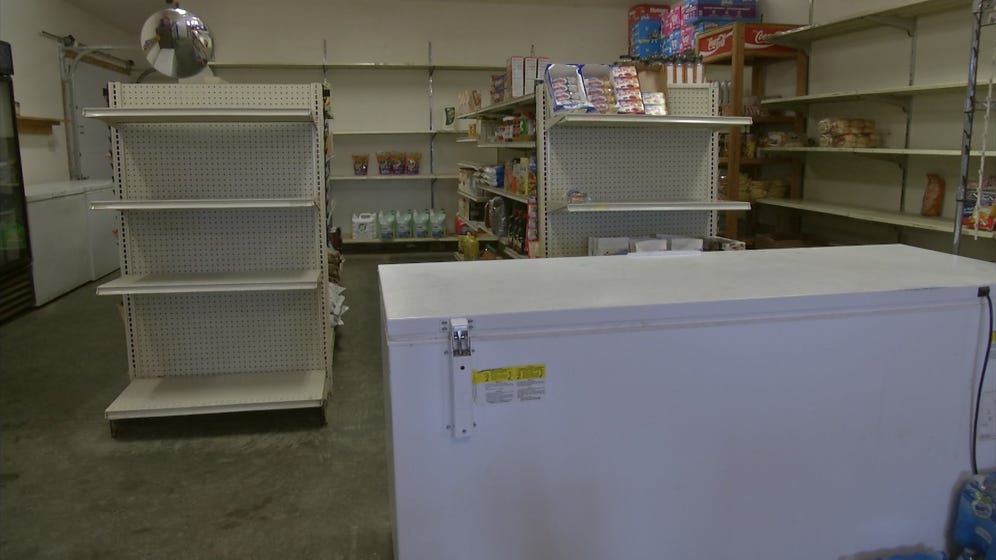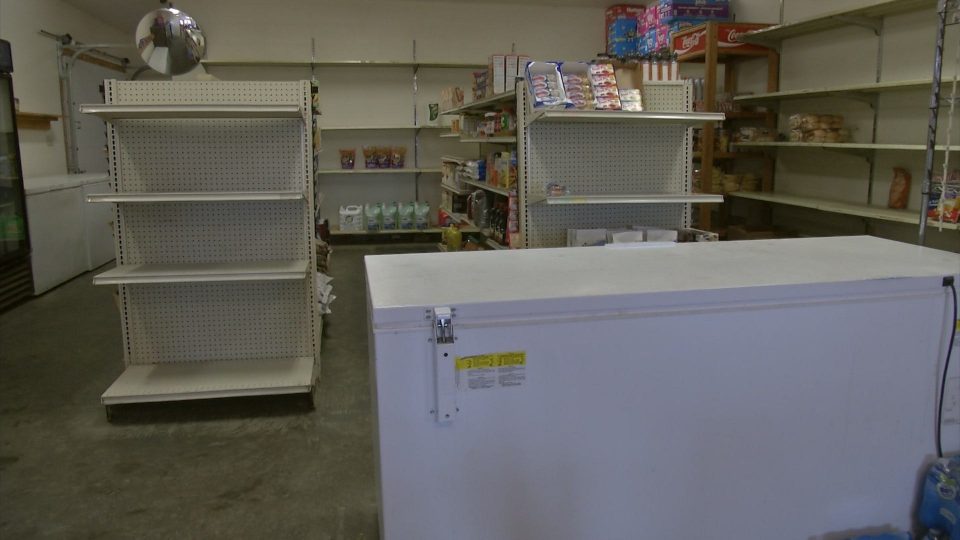News

Cuts to the Alaska Marine Highway System have a wide reach in Southeast Alaska, where communities went for months over the winter without a ferry.
Hoonah, Alaska’s largest Tlingit settlement, is a community of about 700 people on the north side of Chichagof Island.
City administrator Dennis Gray Jr. said it’s a place where people are proud of their roots.
“Hoonah is who I am. I’m Hoonah Tlingit and it’s important that we maintain our identity in who we are,” Gray said. “It’s important to Alaska because Alaska is a coalition of Native communities and non-Native communities; that’s what makes our state great.”
Gray said while Hoonah is a strong community, it also has a fragile reliance on the AMHS that affects all areas of life.
Months without a ferry have left store shelves around town empty.
“This should be full of freeze,” Raino Hill said as he opened a freezer that had been completely cleaned out.
Hill owns Colette’s Cupboard. The mom and pop convenience store is the smaller of the two grocery stores in town.
Hill said there have been many ups and downs in his 20 years of business but the latest halt to the ferry system has been the worst.
“It’s kind of frustrating when they say that the ferry system is a convenience,” Hill said. “That’s like saying the road between Anchorage and Fairbanks is a convenience. Take that road out and see how they feel.”
Hill stocked up on heavier canned goods and items like laundry detergent before the ferry quit running.
The store worked with the local airline to fly in produce and smaller, lighter shipments to get by.
“It’s tough because we’re trying not to raise the prices, holding the prices the same. In the short term it’s not too bad. If it lasts too long of course we’re going to have to jack prices up to recoup costs,” Hill said.
The City of Hoonah has several infrastructure projects staff hoped to get done before the summer, when tourism and fishing are in full swing.
Gray said a sewer repair project and water tank replacement project are both in limbo.
“We’ve got parts coming in from Oregon to construct a tank and we’ve been on hold because we haven’t been able to get the parts in. So a third of our water storage has not been able to get repaired because supplies haven’t got in,” Gray said.
The equipment is too large and heavy to go as freight on small planes, which have been the short-term solution.
Alaska Seaplanes pilots have been busy shuttling people and freight back and forth to Juneau.
Residents said the problems with planes, however, is they’re weather dependent.
Fog and snow have canceled several trips this winter, leaving people with no options.
People who need to get out of Hoonah for medical appointments have struggled too.
“My father can’t hardly fly because of his bad knees, and so he’s got to take the ferry. If there’s no ferry he can’t see the doctor. You can repeat that story 100 times over in town for people and their ability to see their doctors,” Gray said.
Hoonah has a small health center, operated by the SouthEast Alaska Regional Health Consortium, but patients have to go to larger hospitals for specialty care.
The nurse practitioner, Esther Heath Mills, said the clinic has been running low on medications since the ferries stopped running.
“Right now Hoonah, we’ve had influenza A has been hit hard in the community,” Heath Mills said. “Tamilfu is considered a very vital medication for our Alaska Native population which is considered high risk for flu complications.”
The SEARHC clinic stockpiled some medications but not everything staff need for treatments.
Heath Mills said normally she wouldn’t hesitate to prescribe medication to patients in need. But with a limited supply, staff have to make the difficult decision of when to dispense mediation and to whom.
“Unfortunately, when we don’t have it, especially for our elderly and our young patients and infants, we have to really worry and monitor what’s going on with them and making sure that everyone’s taken care of regardless,” she said.
Gray said another consequence of the ferry system being down is the impact it has on cultural events.
After someone dies, Tlingits hold a kooéex’. — a funeral/memorial ceremony.
“There are two moieties, the raven and the eagle and when one passes you give back to the opposite moiety,” Jessie Martin explained. “It’s usually anywhere from a year or more after that person has passed away.”
Many people in Hoonah have connections to family around villages in Southeast and the ferry is their way to travel for a kooéex’.
“For someone from Hoonah to want their kooéex’. at home after they pass is very important. There are people that are not able to do so, or it gets prolonged due to the lack of ferry service,” Martin said.
To alleviate some of the town’s hardship, Alaska Marine Lines sent a chartered barge loaded with last minute freight orders at the end of February.
“Groceries, building goods, construction goods,” said AML distribution manager Brian Lackey.
Typically, there’s no barge service to Hoonah from October to April, and the ferry system fills the void.
Lackey said businesses were grateful for the relief.
“Boy, I’ll tell you my phone just rings off the hook. ‘Did our stuff come in? Did our groceries come in?’ Groceries are definitely priority so whenever we’re unloading the barge the very first thing we do is distribute all the groceries,” Lackey said.
Several pallets made their way to the Icy Strait Lodge, where Hoonah’s only restaurant open in the winter is.
“We’re really pretty dedicated to Hoonah; they’ve always been great. They’re nice people, and we try to do all we can,” said owner Ed Phillips.
Phillips has owned the lodge for two decades. Throughout those years, the ferry system was a reliable way to bring in goods.
Without it, his business is hurting.
“If I didn’t think that we’d have a highway system I would never have entered into this lodge. I would have never done it,” Phillips said.
He was thankful for the barge shipment.
Phillips estimates bringing in supplies by plane is about three times more expensive per pound than going by sea.
He’s also lost thousands of dollars in groceries that have been weathered in at the airport in Juneau.
Phillips said he wants to stay in business, but the state cuts are making that difficult.
“Barb and I often wonder what are we doing staying open. Everybody else closed. I many times have been accused of being stupid because I insist on consistent service for our community because people rely on it. We consider that very important,” Phillips said.
A day after the barge came in, a chartered plane arrived, filled with boxes for Colette’s Cupboard.
Hill said there were too many logistics to get his order in before the barge shipment. Again, he was forced to pay to have the grocery store’s food flown in.
Passengers also came back with totes filled to the brim with fresh produce; one person even checked a single gallon of milk.
While the air freight is more expensive, Hill said he doesn’t want to raise prices to cover the cost if he can help it.
Nearly 15% of people in the Hoonah-Angoon Census Area are unemployed. Many use food stamps to get through the off-season.
Changing prices is a decision Hill doesn’t take lightly because of how it might impact those people.
“They’d have less to feed their children. Prices go up, they can afford less,” Hill said.
People in Hoonah want Alaskans to know the ferries are a lifeline for Southeast in more ways than one.
“I hope our politicians get together and lay the asphalt back out to the villages on the seaways — get our ferries going,” Hill said.
For now, they’re weathering the storm of insecurity, hoping a new day will bring reliable service back to town.
Copyright 2020 KTVA. All rights reserved.
POPULAR STORIES
LATEST STORIES



